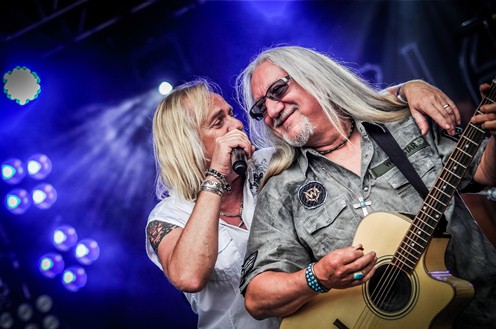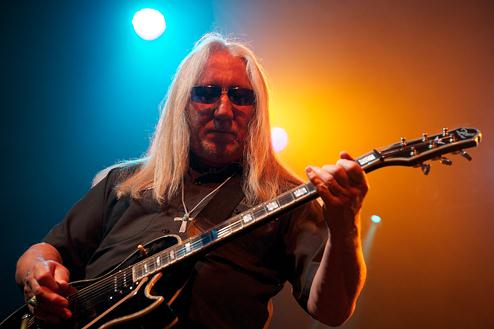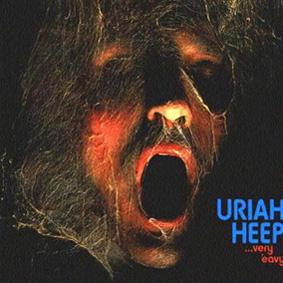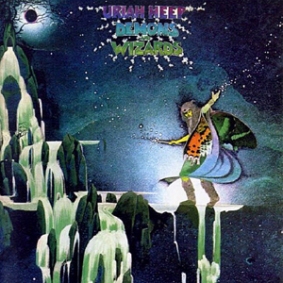|
A&B: Ciao Mick, è un onore per me avere l’opportunità di intervistarti. Presto verrete in Italia, cosa dovremo aspettarci dal vostro show?
Mick Box: Faremo una selezione di canzoni dai nostri 45 anni di carriera. Siamo molto orgogliosi della nostra storia, infatti suoneremo sempre brani come “July Morning”, “Lady in Black”, “Easy Livin ' ”e “Gypsy”, ma intervalleremo le canzoni classiche con quelle del nostro nuovo album, “Outsider”. Proporremo anche parte del materiale più vecchio che ancora ci piace suonare, tornando anche indietro al periodo più prog.
A&B: Preferisci ascoltare sempre il rock o apprezzi anche altri generi?
Mick Box: Ascolto molti generi di musica. È importante essere aperti a tale proposito e non avere una visione limitata.
A&B: Secondo te, tra le nuove band, quali sono le più significative?
Mick Box: Mi dispiace dirlo, ma ultimamente nulla mi ha veramente entusiasmato…
A&B: Come è cambiato il vostro modo di comporre musica dopo 45 anni?
Mick Box: È rimasto lo stesso, di solito parte dalla chitarra si sviluppa da lì. Ha sempre avuto successo e allora perché cambiarlo?
A&B: Nel 1970, quando è stato pubblicato il vostro primo album, una giornalista della rivista Rolling Stone ha scritto: "Se questo gruppo raggiungerà il successo, io mi suiciderò!". Cosa vorresti dirle, adesso?
Mick Box: Melissa Mills non scrive più per Rolling Stone e gli Uriah Heep, 45 anni dopo, sono ancora qui, quindi le abbiamo fatto rimangiare quelle parole. Non ho mai saputo se poi si è suicidata!

A&B: Agli esordi, perché decideste di inserire le tastiere in un contesto decisamente hard-rock?
Mick Box: Abbiamo iniziato a registrare il nostro primo album come quartetto, poi abbiamo cercato di inserire alcune tastiere sui pezzi e questo ha funzionato molto bene. Ero un grande fan dei Vanilla Fudge e l’organo Hammond per me era uno strumento dal suono molto versatile, che si adattava perfettamente alla nostra musica, quindi questo era un passo naturale da fare.
A&B: Quali sono i tuoi ricordi più belli di David Byron e Gary Thain?
Mick Box: Troppi e troppo personali per parlarne! David è stato uno dei più grandi cantanti di tutti i tempi e Gary uno dei più grandi bassisti di sempre.
A&B: Qual è la copertina degli album degli Uriah Heep che preferisci?
Mick Box: Sono tutte significative, ma quella di “Demons & Wizards” è l’immagine di maggior impatto.
A&B: In passato era Ken Hensley che scriveva la maggior parte dei testi degli Uriah Heep, oggi invece partecipi anche tu alla loro stesura: quali sono gli argomenti che ti piace di più trattare?
Mick Box: Tutto ciò che cattura la mia immaginazione, in realtà. Di solito scrivo i testi con il nostro tastierista Phil Lanzon e ci scambiamo le idee a vicenda.
A&B: Ci sono dei brani che i vostri fan vi richiedono dal vivo, ma che non suonate più da tempo?
Mick Box: A volte sì, ma se dovessimo soddisfare ogni richiesta staremmo sul palco per una settimana!

A&B: Quali chitarristi ti hanno maggiormente influenzato?
Mick Box: Direi sicuramente Django Reinhardt e Jeff Beck.
A&B: Chi è invece il tuo musicista preferito di oggi?
Mick Box: Jeff Beck. E' ancora incredibile…
A&B: Che consiglio daresti ai musicisti rock di oggi?
Mick Box: Credere in se stessi e lavorare con la propria arte, ma non dimenticare mai di cercare di trovare qualcosa di originale per distinguersi dalla massa. Tanti musicisti di oggi si somigliano sia nel look che nel sound.
A&B: Qual è il segreto della longevità degli Uriah Heep?
Mick Box: Belle canzoni che hanno superato la prova del tempo e che il pubblico ama ancora ascoltare dal vivo e, parallelamente, continuare a scrivere nuovo materiale.
A&B: Ultime parole per i fan italiani…
Mick Box: I fan italiani sono molto appassionati alla musica rock e noi la suoniamo con passione, quando facciamo date in Italia. Non vediamo l'ora di venire a suonare da voi! A presto!
A&B: Grazie ancora per avermi concesso questa intervista Mick e lunga vita agli Uriah Heep!
***********************************************************************
ENGLISH VERSION
Among the most famous and long-lived British hard-rock bands, Uriah Heep, in their 45-year career, have written important pages of the history of this genre. They have always distinguished themselves from the stiff competition by introducing keyboards, a fundamental element of their sound. Album like “Salisbury”, “Look At Yourself” and “Demon & Wizards” are now acknowledged as milestones of the 70’s rock and the band, despite many changes in its formation, is still alive and well, and since 2008 has been publishing (excellent) albums every three years. On the occasion of their concert at Lido Po di Boretto, near Reggio Emilia, on 1st August, we have interviewed Mick Box, guitarist, leader and sole member of the original formation.
A&B: Hello Mick, it’s a great honor for me to have the opportunity to make this interview with you. Soon you’ll come in Italy, what shall we expect from your show?
Mick Box: We will do a cross section of songs from our 45 year career. We are very proud of our history, so we will always play July Morning, Lady in Black, Easy Livin’ and Gypsy but we will intersperse these classic songs with songs from our new CD Outsider. We will also visit some of the older material which we enjoy playing, even going back to those proggy days.
A&B: Do you always prefer to listen to rock music or do you appreciate different genres too?
Mick Box: I listen to many genres of music. It is important to be rounded in that regard and not have tunnel vision.
A&B: In your opinion, among the new bands, which ones are the most significant?
Mick Box: I am sorry to say that but nothing lately has really excited me..
A&B: How has your way of composing music changed after 45 years?
Mick Box: It is the same as it usually starts on the guitar and grows from there. It has always been a successfull way so why change it...?
A&B: In 1970, when your first album was published, a journalist of the magazine Rolling Stones wrote: “If this group achieves success, I’ll commit suicide!”. What would you tell her now?
Mick Box: Melissa Mills is not writing for the Rolling Stone Magazine anymore, and Uriah Heep are still here 45 years later, so we made her eat those words. I never found out of she committed suicide!

A&B: At the beginning, why did you decide to introduce the keyboards in a definitely hard-rock context?
Mick Box: We started recording our first album as a four piece, and then we tried to augment some keyboards on to the tracks, and this worked very well. I was a huge Vanilla Fudge fan and the Hammond Organ being a very versatile sounding instrument, fitted perfectly to our music, so this was an obvious step to take.
A&B: Which are your most beautiful memories of David Byron and Gary Thain?
Mick Box: Too many and too personal to mention! David was one of the all time great vocalists, and Gary one of the all time great Bass Players.
A&B: Which sleeve of your albums do you prefer?
Mick Box: They all make a statement, but Demons & Wizards had the most impact.

A&B: In the past Ken Hensley wrote most of the lyrics of Uriah Heep, today you too take part in their writing: which are the subjects you most like to deal with?
Mick Box: Anything that captures my imagination really. I usually write these with our keyboard player Phil Lanzon and we bounce ideas off each other.
A&B: Are there songs that your fans ask you during concerts, but that you haven’t been playing for a long time?
Mick Box: Sometimes yes, but if we played every request we would be onstage for a week.
A&B: Which guitarists have most influenced you?
Mick Box: I would say Django Reinhardt and Jeff Beck. Definitely.
A&B: Who is your favorite musician of today?
Mick Box: Jeff Beck. He's still amazing..

A&B: What advice would you give to the rock musicians of today?
Mick Box: Believe in yourself and work at your art, but never forget to try and find something original to make you stand out from the crowd. So many of todays musicians all sound and look alike.
A&B: Which is the secret of Uriah Heep’s longevity?
Mick Box: Good songs that have stood the test of time that people still like hearing in the live arena, and constantly writing new material.
A&B: Last words for italian fan
Mick Box: The Italian fans are very passionate about their rock music, and we are very passionate about playing it, so we always have a good time performing concerts in Italy. We cannot wait to come and play! ‘Appy days!
A&B: Thank you very much for your time Mick and long live Uriah Heep!
****************************************************************************
|